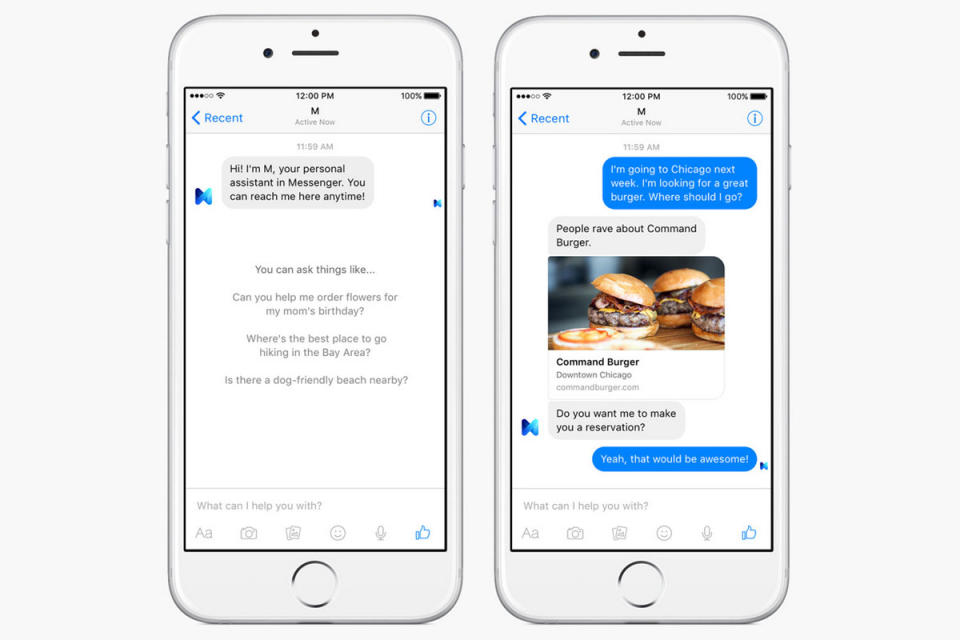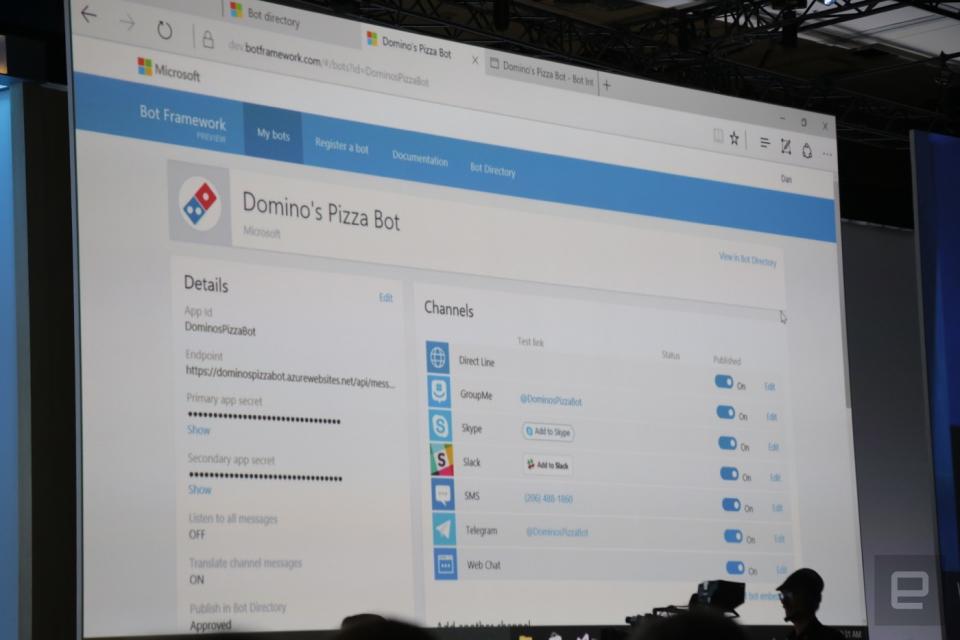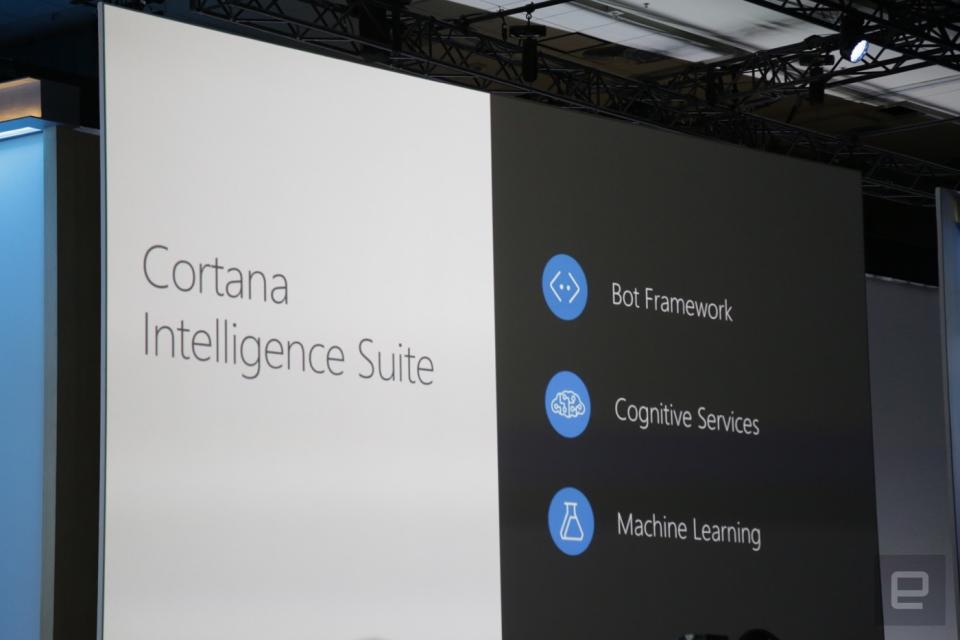Microsoft hopes Cortana will lead an army of chatbots to victory
But it needs an army of developers to make that happen.

If Bloomberg Businessweek's latest cover story didn't make obvious enough, the hour or so Microsoft dedicated to it on stage at its Build developer conference should have cleared up any doubts: Cortana as a big part of the company's future. Microsoft wants the AI assistant to do everything, but knows it can't make that dream a reality by itself. The new framework allows developers to build an independent chatbot that plays nice with users and Cortana. Microsoft isn't the only one pursuing the goal of the perfect assistant, though, and there's no telling if its efforts to inspire an army of chatbots will be successful.
Although chatbots have been around for half a century, they didn't have a practical use until the internet took hold. SmarterChild, which was popular on AOL AIM and Microsoft Messenger, worked like an advanced directory inquiries, giving out business information, weather and even movie times. Google searches quickly took over this functionality for most users, though, and more modern interpretations have largely taken the form of a personal assistant.
Apple's Siri, released in 2011 with the iPhone 4S, blended conversational interactions with basic functionality like opening apps, playing music, and managing calendar appointments. In 2012, Google Now took a more automated approach, surfacing information based on your search results, calendar, and email. Cortana, which debuted in 2013, built on this with greater integrations, deep links into apps and a secure, personalizable "Notebook" that stores user information. In the meantime, developers in China were doing something completely different.
WeChat's business-bots
WeChat is a Chinese chat app with more than 650 million active users. Years ago, local businesses began taking advantage of its popularity, creating accounts not just to field customer service inquiries but also to process purchases and reservations. This started with human representatives manually handling requests, but companies began to automate the process using chatbots.
Microsoft is very familiar with WeChat: It's run numerous tests on the service, with varying success -- it once deployed 100,000 bots on the platform, only to have them pulled down within days. The company's now-famous -- or perhaps infamous -- Twitter bot Tay is actually a sibling to Xiaoice, a bot that's lived peacefully on WeChat, as well as Weibo and Line, for years. It should come as no surprise, then, that Microsoft CEO Satya Nadella called out WeChat on stage today, noting how easy it's made interacting with businesses in China. Qi Lu, Microsoft's senior vice president in charge of Bing, Skype and Office, made the inspiration clearer: He told Bloomberg Businessweek that the power of chatbots "was somewhat accidentally invented by WeChat," adding that Microsoft now "has a leadership role to play" in the field.
Modern interpretations
Despite dabbling with WeChat for the past few years, Microsoft is a little late to the functional chatbot party. Ostensibly, the Amazon Echo is an intelligent wireless speaker. In reality, it's all about "Alexa," Amazon's voice-based functional chatbot. Alexa is always listening and can answer basic queries – the sort you'd give to present-day Siri or Cortana – but it also lets you order stuff from Amazon or pay off your Capital One credit card bill. The retail giant has been rapidly iterating on the platform, and the recent spate of new hardware shows its dedication to the cause.

Facebook, too, has been experimenting with the idea of chatbots. Its "M" assistant, currently in a limited test, can handle all sorts of inquiries. It uses both Facebook's pool data on you and conversational AI to let you buy or book almost anything (BuzzFeed pushed this to the Nth degree to rent an army of parrots). M is in an extremely early phase right now and relies heavily on human workers, but this isn't the long-term plan. The employees are apparently training the AI on how to deal with requests, which it's hoped will let Facebook deploy a less human-dependent bot in the future.
Google's also supposedly working on an AI-powered chat assistant, according to a December report from The Wall Street Journal. It'll apparently mirror M in many ways, but until we hear more about it — perhaps at Google I/O in June — it's difficult to say how it'll differentiate itself. The one thing we can say for sure is Amazon, Facebook and Google are all powerhouses that would love to be the conduit by which you live your life online. Sure, Amazon might be more focused on selling you things, from its store, and Google might want more data for advertisers, but when it comes to personal assistants, the goal is similar.
Microsoft's approach
Microsoft is coming at this from a slightly different angle, though. Facebook may know a lot about you, but it doesn't have your private data, it doesn't have access to your files and it can't track what you do outside of your web browser. Cortana is already a cornerstone of Windows, and at BUILD today Microsoft showed the personal assistant keeping track of various presenters' lives, from daily interactions with colleagues to recalling which toy store someone had visited a year ago. It's also available on iOS and Android, albeit in a less-powerful form.
Microsoft's plan to transform Cortana from a helpful personal assistant into a fully fledged chatbot is simple: Make companies build their bots that play nice with its own. To that end, it released the Microsoft Bot Framework, a tool to create AIs that can be deployed across a wide variety of services. On stage the presentation demonstrated a simple Domino's bot that could process pizza orders on its own. Although the demonstrations were largely shown in the Skype app, the bots are platform independent. The company confirmed compatibility with third-party services like Slack and Telegram, and even SMS. It's clear from this broad compatibility that Microsoft wants its bots to be everywhere.

The Domino's bot had the safety net of a human operator when things went awry. Even when the fleshbag takes over, though, the bot is still suggesting dialog and making sure orders are processed using the correct syntax. That's vital when you consider Microsoft's endgame here: It wants Cortana to be able to talk to Domino's on your behalf. By creating a free, open-source framework for companies to build upon, it's essentially ensuring that Cortana will be able to talk to a vast network of business without issue. Companies, for their part, get a functional chatbot that works with or without Microsoft's assistant.
The move echoes Microsoft's strategy at large. Under Nadella, the company has accepted that it can't be everything to everyone but wants to make sure it's relevant in as many markets as possible. And if everyone uses Microsoft's framework, the cross-platform Cortana will be an enviable position versus Amazon's Alexa and Facebook's M.
Competing platforms
It's worth noting, though, that Facebook has made moves to open up its Messenger platform. The social media giant has apparently gone so far as to secretly release a chatbot SDK of its own to select developers. The SDK reportedly lets developers build apps for Messenger that facilitate purchasing goods, making reservations – basically everything Microsoft's does. Whether Facebook will release this SDK publicly isn't clear, but the chances of it playing nice with services outside of Facebook's purview seem slim. Google, too, if the rumors are to be believed, is building its own platform, and encouraging developers to build bots for it, building on its efforts to integrate third-party services into Google Now.
Microsoft, on the other hand, is being remarkably open in its efforts to attract developers. Its framework is available on Github, rather than a company developer portal. It has clear guidelines, and can be coded in either C# (one of Microsoft's languages) or the open-source node.js environment. Stefan Rimola, a front-end web developer at Engadget, says the documentation and language choices make it "easy to pick up" for a "broad spectrum" of devs.

But herein lies the problem. As sound as Microsoft's strategy seems, it can't go it alone. The company has had big problems attracting developers since the modern Windows era began. It's made steps towards rectifying that, like buying Xamarin to encourage the use of Windows as a cross-platform development tool, or surprising the world by integrating the Linux command line into Windows. Its cross-platform, open approach with the chatbot echoes this attitude.
There's no way of telling if companies will embrace Microsoft. Chances are Facebook, Amazon, Google and Apple are all shooting for the same thing. We could end up with multiple competing bot platforms (just as with chat apps themselves), each with access only to certain third-party services. If Microsoft can get developers on board and establish a lead, maybe it can persuade Facebook, Amazon, Google and Apple to play nice with its framework. But that's a big if.
